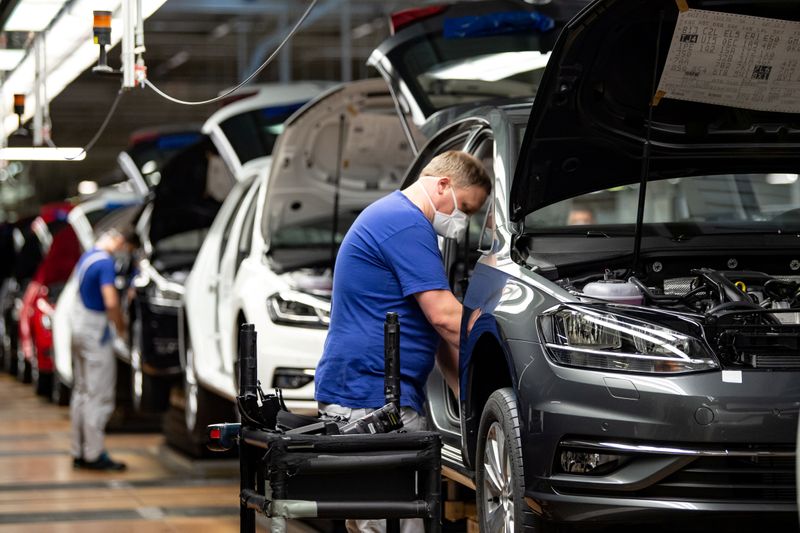BERLIN (Reuters) - German industry output plunged 9.2% in March, its fastest decline since current records began in 1991, data showed on Thursday, as the coronavirus pandemic slashed demand for goods from Europe's biggest economy.
The auto industry, which was Germany's biggest exporter and employed more than 800,000 people before the outbreak, contracted by 31.1% on the month.
Analysts said worse was in store. Andreas Scheuerle of DekaBank calling the headline reading "a curtain raiser for the horror show".
Expectations in a Reuters poll were for a 7.5% drop.
A breakdown of the data showed that export-dependent manufacturing was most affected by the slump in demand, contracting by 11.6%, including a 16.5% drop in capital goods.
Figures published on Wednesday showed that orders for German industrial goods dived 15.6% in March to their lowest level since records began in 1991.
Construction offered the only glimmer of hope. Activity rose by almost 2%, the data showed.
The data reflected the impact of a shutdown and restrictions that Germany imposed in mid-March to slow the spread of the coronavirus. So far, it has withstood the pandemic better than the United States and most of its European neighbours.
SLOW RECOVERY
The government expects the economy to shrink by a record 6.3% this year despite measures to mitigate the impact of the crisis with a 750 billion-euro ($809.33 billion) stimulus package and a short-time work subsidy scheme that lets employers move staff to shorter hours rather than laying them off.
The Ifo institute said on Thursday that its industrial production index had hit its lowest level since German reunification, signalling that the sector expects an unprecedented collapse in activity.
Helge Braun, Merkel's chief of staff, said on Thursday the pandemic will last for at least the rest of this year and economists have cast doubt on a quick economic recovery even as Germany starts to reopen its economy and lift restrictions.
"There is sure to be another large fall in April given that severe restrictions were in effect throughout last month," said Andrew Kenningham of Capital Economics. "We expect demand to recover only slowly because many households have suffered a loss of income and savings, and will be less confident about the future."
Merkel announced steps on Wednesday to ease the coronavirus lockdown in Germany. At the same time, she installed an "emergency brake" mechanism to restore restrictions if infections pick up again.
Under measures agreed with Germany's 16 federal state leaders, people from two households will be allowed to meet, and more shops will open, provided hygiene measures are in place.
Analysts said even if the domestic economy recovers, a full German recovery depends on the pace of economic activity in its European neighbours.

"No matter how quickly Germany gets back to normal, it will be constrained by the recovery in the rest of Europe given its dependence on external demand," Kenningham wrote in a note.